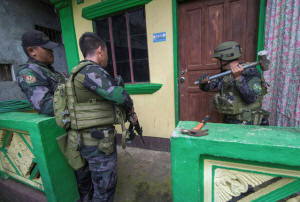|
Philippines army struggles as city siege
enters fourth week
 Send a link to a friend
Send a link to a friend
 [June 13, 2017]
By Neil Jerome Morales and Simon Lewis [June 13, 2017]
By Neil Jerome Morales and Simon Lewis
MARAWI CITY, Philippines (Reuters) -
Fighting in Marawi City in the southern Philippines entered its fourth
week on Tuesday with military officials conceding that troops were
struggling to loosen the grip of Islamist fighters on downtown precincts
despite relentless bombing.
Military spokesman Brigadier General Restituto Padilla said the urban
terrain was hampering the army's progress because the rebels had
hunkered down in built-up neighborhoods, many of them with civilians
they had taken as human shields.
Hundreds of other civilians were still trapped in the ruins of the town
and - facing capture, starvation or bombardment from above - several
have braved sniper fire to dash across a bridge to safety. Some were
shot dead, a few made it alive.
Asked when the fighting would end, Padilla said: "I can't give you an
estimate because of compounding developments faced by ground
commanders."
The military had set Monday, the Philippines' independence day, as a
target date to flush out the militants, both local and foreign fighters
who have pledged allegiance to Islamic State.
Flags were raised at ceremony in the town on the insurgency-plagued
island of Mindanao, but heavy gunfire resumed early on Tuesday, and the
military continued to target the militants with mortars and
helicopter-mounted machineguns.

President Rodrigo Duterte, who declared martial law in Mindanao on May
23 - hours after several hundred fighters overran parts of the town and
tried to seal it off to create an Islamic caliphate - did not show at
any independence day events.
Duterte is best known for a brutal war on drugs since he took office a
year ago, and he has suggested that funding for the Islamist militants
came from the narcotics trade.
Some media reports highlighted the absence of the president at a time of
serious conflict, but a spokesman said he was tired and needed to rest.
The Philippines has been fighting twin insurgencies from Maoist-led
rebels and Muslim separatists in the south for nearly 50 years. Critics
say military action is not enough to bring peace to a region that has
long suffered from political neglect and poverty.
'PURE PROPAGANDA'
The seizure of Marawi has alarmed Southeast Asian nations which fear
Islamic State - on a backfoot in Iraq and Syria - is trying to set up a
stronghold on Mindanao that could threaten their region.
The ultra-radical group's news agency, Amaq, said the military in the
largely Christian Philippines had "completely failed" to take back
Muslim-majority Marawi.
"Islamic State fighters are spread in more than two-thirds of Marawi and
tighten the chokehold on the Philippine army that is incapable of
maintaining control of the situation," it said.
Padilla branded the Amaq report "pure propaganda".
Responding to the report, Lieutenant General Carlito Galvez, head of
military command in Western Mindanao, told Reuters the militants
controlled 20 percent of the town.
That is at least twice the area that the military had given a week ago,
when it had said the rebels were holed up in a sliver of urban terrain
equal to 10 percent and shrinking.
[to top of second column] |

A joint group of police and military forces use a mallet to open a
door while conducting a house to house search as part of clearing
operations in different sections of Marawi city. REUTERS/Stringer

Almost the entire population of about 200,000 fled after the
militants tried to overrun it, but the military believes that beyond
the checkpoints now fencing off its main roads there are still some
300-600 civilians trapped or being held hostage.
Padilla said about 100 militants were still fighting, down from the
estimated 400-500 who stormed the town.
Former military chief Rodolfo Biazon told ABC-CBN television on
Monday that the government seemed to be struggling to control the
situation because rebel forces could move freely in an out of the
town, raising the prospect of reinforcements.
"Marawi has porous boundaries. You see them in one place of Mindanao
today, you see them in another place tomorrow," said Biazon, also a
former legislator.
As of Tuesday, the number of security forces and civilians who had
died in the battle for Marawi officially stood at 58 and 26,
respectively. The death toll of militants was put at 202.
Islamic State's Amaq news agency said that at least 200 government
troops had been killed and many had abandoned their posts, leaving
behind weapons that were seized by the militants.
It released a video showing the insurgents fighting and what it said
was the execution of six Christians who were shot simultaneously in
the back of the head. Reuters was not able to independently confirm
the authenticity of the video.
At dawn on Tuesday, five police officers and five Christian
civilians ran through the city's commercial district to reach a
government-controlled area on the Agus River's west bank.

The military said that, in another incident, the insurgents knocked
on the door of a house where 18 people were hiding. They escaped
through a back door, but five were shot dead, eight were captured
and only five made it to safety at the river.
(Additional reporting by Karen Lema and Manuel Mogato in MANILA;
Writing by John Chalmers; Editing by Robert Birsel)
[© 2017 Thomson Reuters. All rights
reserved.]
Copyright 2017 Reuters. All rights reserved. This material may not be published,
broadcast, rewritten or redistributed. |